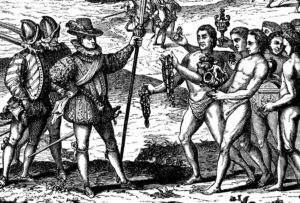From Salon: “What does it tell us about our civilization that Columbus Day is celebrated as a federal holiday, with parades, barbecues and football games, instead of a somber recognition of genocide, such as the International Holocaust Remembrance Day that commemorates the atrocities of the Nazis? The answer might offer a key to a sustainable future for our civilization.
When Christopher Columbus first made landfall with his crew on the island of Hispaniola in 1492, he was taken aback by the generosity and benevolence of the Taino people he encountered. He wrote in his journal how, if the Europeans asked them for something, they would freely share anything they owned ‘and show as much love as if they were giving their hearts.’
It didn’t take long, though, for his mind to wander off in a different direction. Columbus quickly realized how easily he could take advantage of them, writing to the King and Queen of Spain how the Taino were so naïve that they cut themselves out of ignorance when they held a sword. ‘Should your Majesties command it,’ he wrote, ‘all the inhabitants could be taken away to Spain or made slaves on the island. With fifty men, we could subjugate them all and make them do whatever we want.’
Columbus was obsessed with recklessly exploiting whatever he discovered in the New World, regardless of the consequences. He wasn’t alone in this. In fact, the entire European conquest was based on the premise of ruthless exploitation in order to enrich the explorers and those who had financed them.
The result was the greatest genocidal catastrophe that has occurred yet in human history. In every region European explorers discovered, a decimation of the local population ensued of almost unimaginable proportions. The population of central Mexico was 20 million in 1500, four times greater than Britain. Within a century, there were fewer than one million people alive there. Similarly, the population of the Inca empire collapsed from 11 million in 1500 to less than a million in 1600. It’s been estimated that in the 16th century alone, close to 100 million indigenous people died in the Americas through slaughter, starvation or disease.
Many historians have pointed the finger to the new diseases the Europeans brought with them that ravaged the local populations, some even going so far as to suggest that this catastrophe was inadvertent: a sad but inevitable consequence of human ‘progress’ [sic]. However, as historians such as David Stannard and Eduardo Galeano have excruciatingly documented, the Europeans approached the new territories with a systematic compulsion to exploit remorselessly every last resource — human and mineral — they could ransack from the land. The havoc caused by European diseases just made their job that much easier.
In fact, as I discovered in researching my book, The Patterning Instinct: A Cultural History of Humanity’s Search for Meaning, this obsession with exploiting resources without regard to consequences was unique to the European mindset — which has now become the predominant global mindset as a result of the European conquest of the rest of the world. Even though the facts of history make its direction seem inevitable, it didn’t have to be that way. Our modern world, and the values on which it’s founded, are the consequence of a particular way of thinking that arose only in Europe.”

***
Back to Around the Web











